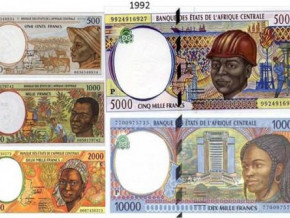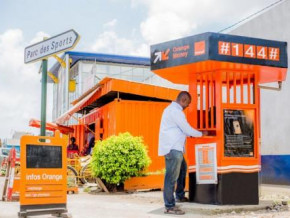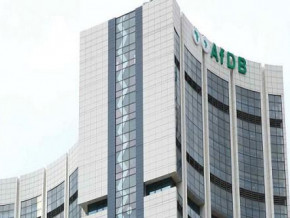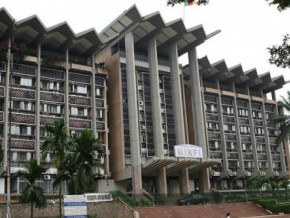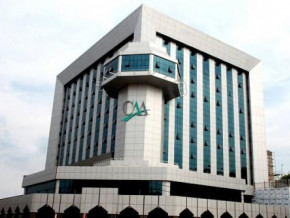
International pressure mounts on Cameroon for assisting Russia in dodging oil sanctions

(Business in Cameroon) - The London-based International Maritime Organization (IMO) is expressing concerns over certain vessels flying the Cameroonian flag, accused of being part of a "ghost ship" fleet facilitating Russia's oil exports. These ships allegedly enable Russia to sell its oil for more than $60 a barrel, breaching sanctions imposed on the country following the onset of the war in Ukraine. The IMO's worries were conveyed to Cameroon's Minister of Transport, Jean Ernest Ngalle Bibehe, by the UK High Commissioner to Cameroon, Barry Lowen, on March 14, 2024.
As a reminder, following the start of the Ukraine war in February 2022, the G7 countries (United States, United Kingdom, Germany, France, Italy, Japan, Canada), the European Union (EU), and Australia decided to cap Russian oil prices at $60 per barrel. This measure aimed to cut Russia's oil revenue—and consequently, its military spending—accusing it of invading a sovereign state. To enforce this, these nations prohibited their maritime transport and insurance companies from handling Russian oil shipments priced above the set cap.
Moscow has sought to bypass these measures by relying on an alternative fleet. However, the IMO believes this fleet consists of ghost ships, referring to vessels that flout international regulations and best practices, lack insurance and deliberately evade inspections. The IMO General Assembly even passed a resolution in December urging member states to ensure that ships registered under their flags do not operate as part of “ghost fleets" designed to circumvent sanctions set by the General Assembly or the UN Security Council.
According to the American economic news agency Bloomberg, of the 14 oil tankers flying the Cameroonian flag in 2023, 11 could be traced back to Russian oil ports. In January, The Maritime Executive reported that Cameroon had become a haven country for the ghost fleet. “Historically, vessels registered in Cameroon have been linked to other oil smuggling operations notably including Iran and Venezuela,” wrote the maritime business journal.
Cameroon's response
On January 2, 2024, the United Arab Emirates informed Cameroonian port authorities about the prohibition of Cameroonian-flagged ships navigating its waters. “Within the framework of the UAE Federal Maritime Administration (FMA) represented by the Ministry of Energy and Infrastructure, responsible for regulating the foreign ships operations in the UAE waters and ports, this Administration has decided to include the vessels registered under the flag state of “Republic of Cameroon” to the existing list of restricted flag State vessels calling UAE waters and ports, unless they are classified by a member of IACS ((International Association of Classification Societies) Class or by the Emirates Classification Society – Tasneef,” wrote the Emirati authorities. “Accordingly, all the maritime companies and ship agents in UAE are hereby requested not to provide the services to those vessels that are not complying with this circular to avoid legal accountability”.
"Cameroon has always swiftly reacted to information provided on identified errant ships and, after verification, has deregistered these ships," responded the director of maritime affairs and waterways at Cameroon's Ministry of Transport. According to Jean Nlend, the challenge is that Cameroon is not yet integrated into the Global Integrated Shipping Information System (Gisis), despite "enormous efforts" made so far. "This gap makes it impossible for Cameroon to track ships flagged in red zones," Jean Nlend explained. Consequently, Cameroon has sought assistance from the UK for integration into this system. Gisis, a database operational since March 1, 2006, provides access to a range of information related to international maritime navigation.
The support requested by Yaoundé might also extend to the digitization of the registration procedure. According to the Cameroon Ministry of Transport, the current situation "challenges the procedure for registering ships under the Cameroonian flag." Transport Minister Jean Ernest Ngalle Bibehe noted that over 200 ships currently registered in Cameroon fly the Cameroonian flag in international waters. These registrations, he reminded, are made in the ports of Douala, Limbe, Kribi, and Garoua, per the March 31, 1962, ordinance commonly known as the Cameroonian Merchant Shipping Code and the decree of September 6, 1962, setting the conditions for naturalization and registration of ships.
While waiting for Cameroon's integration into Gisis, it was recommended that information on ships outside regulation and good practices be regularly provided to Cameroon.
Mags frontpage
- Most read 7 days
- shared 1 month
- read 1 month



